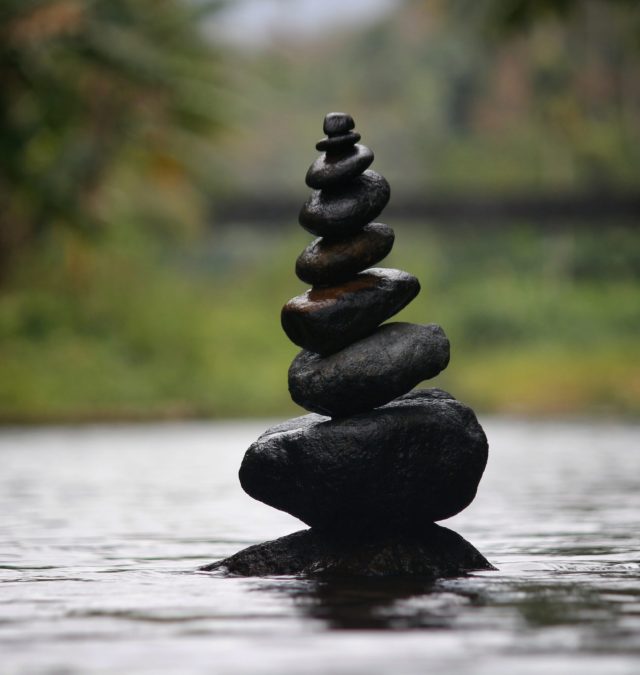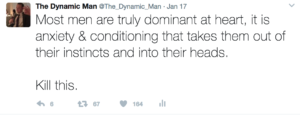
FOLLOW YOUR INTUITION
Last weekend I went to see a cousin of mine.
Hard to say exactly why.
We hadn’t really talked that much, except through email.
But it was a feeling — a feeling that had been nagging me since the start of the new year — that we needed to see each other.
The trip was 7 hours, but spring was coming. The symbolism was not lost on me.
I shot him an email and told him I was making the journey down.

I spent the drive listening to the Mark Baxter Podcast, filling my brain with food, and collecting my thoughts.
What had pushed me on this long, strange sojourn? What would I get out of it?
I didn’t know. But I was excited to find out.
I pulled up into the driveway and went up to the door. It had been half my life since I had visited; we hardly knew each other.
But the moment he opened the door, I knew I was right to have come.
Hours later that next morning, after drinking and feasting on fine wine and food, and chatting the night away, I left with my soul nourished, like drawing from a cold spring after a long hike.
But why?
Traveling 14 hours to see a man you hardly know just for dinner hardly seems like a logical decision.
Which is why I’m happy I rarely use logic these days for my life choices.
Why Thinking Things Through Is Leading You To Mediocrity And Stagnation
I have a reputation among those who know me for spontaneity.
I’ll book a trip to some crazy locations for just a quick stop over, or decide on a restaurant not based on Yelp but something different about it that strikes me as appealing.
To people who do not live in my brain, these decisions are random, even impulsive.
Yet to me, they are the bread and water of living a good life.
I can say with full honesty I have never regretted an exploration based on intuition.
(Indeed, I met my wife only because I made the “bizarre” decision to fly to Poland for a weekend to attend a wedding where I knew nobody.)
The returns on intuitive choices vary, but they are never decisions that cost me. Even when they end up less than appealing, I come away with some insight or story I didn’t have before. Not staleness or regret.
Choices made on thinking, on the other hand, are generally the reverse.
Obsessing over options. Carefully considering cost/benefits.
A big mistake.
I mean it.
I don’t trust my thinking, and neither should you.
Most of our conscious and subconscious minds are completely out of whack.
Our childhood baggage and social conditioning have cultivated anxiety and behavioral patterns in us that we follow, even when they don’t sit right with us and make us feel worse.
They manifest themselves as a voice, telling us what we “should” do rather than what we truly want to do. This voice is particularly attuned to the opinions and feelings of other people, manipulating us into doing what we imagine those people would want or approve of.
(Read: Say No And Do What You Want)
No bueno.
Yet there are many ways this voice manifests itself.
The self-indulgence, laziness, “responsibility” — sometimes all of them at once come into the fore as weaponized rationalizations to stop you from following your intuition.
But the biggest way by far is through fear.
Intuition’s Biggest Enemy: Fear
Fear is a dangerous beast. It will turn your cognitive abilities against you. It wants nothing better than for you to ignore your intuition and embrace inaction.
There is no bigger threat to intuition than fear.
Fear knows where your weak spots are — and with the power of our cognitive mind, it can convince you by leveraging your emotions to choose the “easier” route. When your intuition tells you just do it or find out, fear tells you I can’t be bothered or what if.
Yet fear is more clever than that. It comes from deep inside your body, so it feels many times as real if not more so than intuition.
If you want to avoid succumbing to it, you must learn how to separate the two.
There are three rules to follow to do it.
Rule #1 Of Separating Intuition From Fear: Timing
Your intuition is the bubbles that well up from your subconscious. Wherever they come from, they are your first feelings about something.
Fear does not spawn out of the ether like that; they come after in response to your intuition.
This is because intuition is fundamentally about direction. It says “here is the path you should take,” which is why the expression “follow your intuition” is so popular. Fear is different, it doesn’t care about that; it simply tells you whether or not to take the path. It is more emotional in that way. It doesn’t present an appealing alternative nor care about it. Whatever outcome would occur from inertia is fine — so long as you just say no to following your intuition.
Rule #2 Of Separating Intuition From Fear: Regret
An easy test of whether you are experiencing intuition or fear is to ask yourself a simple question.
Will I regret doing / not doing this?
If you will, then that’s not your intuition holding you back. It’s fear.
Again, intuition is about the journey, not the moment’s emotion. It’s about what you will get out of an experience, not necessarily what you will feel in it.
Fear focuses on the short-term downside vs the longterm upside — a recipe for regret.
Always ask yourself where your regret lies. Intuition is designed to destroy regret, so it will never guide you wrong here.
Rule #3 Of Separating Intuition From Fear: Persistence
Remember: While fear is an emotion you feel only in the moment; intuition is a guiding feeling.
In other words, if not acted upon, it generally persists.
This won’t happen all the time, of course, as some intuitive feelings are situational. For instance, on the way back from that same trip to see my cousin, I saw a small oyster shack on the Virginia Eastern Shore. I pulled over “impulsively” to get a bushel — unsurprisingly another great intuitive decision.
That evening I got to shuck what turned out being the cheapest and most delicious oysters I ever had with my niece (her first experience eating them, and not one she’ll soon forget). And not only that, I got the chance to wash them down with a bottle of Virginia wine that had been grown on oyster shells from the same area. Talk about terroir — the vines were 50 feet from where my food was caught!
(Read: Little Moments Define You)
Yet though I would have regretted not going to the shop, who knows if I would have ever gone back, or if it would have been the same if I had.
So long as the door remains open, however, such as in the case of a big life decision, the intuition will linger in the background.
Fear won’t.
So if you’re feeling malaise, understand that your intuition is trying to send you a message that you need to do something.
You may not know what exactly at first. Sometimes dissatisfaction in one area of your life is really just projection into another one.
(Read: Are You Thinking Of Breaking Up? Ask Yourself This Question First)
Once you find out what though, run that direction while you still can. Don’t walk.
Doors close all the time.
—-
So those are the three ways you can distinguish intuition from fear.
But while fear might be an enemy, and thinking is too often used in the service of fear and must be dismissed, not all thinking is bad.
It just depends on when and how you use it.
Follow Your Intuition First, Think Later
If anything should be clear by now, it’s that our thinking brain has a major deficiency: it is far too easily co-opted for the wrong purposes. It’s socially-conditioned, ignorant of our feelings, and isn’t really equipped to help us achieve our subjective, often esoteric, personal desires.
(Read: Why Smart People Are Stupid)
So rather than use logic as our primary life-decision making tool, we need to start thinking (ha) about it instead as an auxiliary.
We need to use intuition to guide us to our target, and only logic afterwords to zero-in.
For example, this past winter I got the urge to stay in downtown Warsaw before my flight back to the United States.
Normally, I would have just stayed at a friend’s place, caught up, the usual. But this time I wanted to feel like an explorer in the city again; I wanted autonomy. It had been 4 years since I had “toured” the city and I needed to do it again.
I told Kate she could either join me or not — and I hoped she would — but I was going. She didn’t know what I was fixating on but she acquiesced.
The result was one of the best nights out of the year: unbridled adventures, zero fights, and honeymoon phase sex.
I was wholly aligned with my intuition, and I felt it. But sadly, although the next day I didn’t feel like I was supposed to leave, I had a flight. I assumed I’d have to take it on the chin: I care about following my intuition, but this stuff isn’t black and white. I couldn’t justify thousands of dollars in rescheduling for one more day. That’s a lot of money for not a lot of return.
Which was why I was pleasantly surprised to learn my flight was overbooked.
In the end, I not only got my extra day, but a hotel, dinner, and 600 euros for the pleasure.
This may sound too good to be true, but this isn’t a fluke. It’s happened before. And it’s what happens when you let your intuition be your guide. God, the universe, whatever you want to call it — things start happening exactly how you want.
Yet although the broad strokes of all of this were due to intuition, thinking still played a major role in the success of this trip.
For instance, while my intuition narrowed down the neighborhoods I wanted to stay in, my logical mind picked the places.
While my intuition told me I wanted to go for a walk and see the sites, my logical mind picked the optimal route and made sure my day was scheduled appropriately to fit everything in.
If my intuition told me to change something later, my thinking mind would find a way to accommodate it.
See how that works?
Intuition made sure I was in the right place, and thinking took care of the details, making sure it was feasible.
Not the other way around.
And it’s what made this whole trip — and all my other decisions I look back fondly on — a success.
Conclusions: How And Why To Follow Your Intuition
If you want to know how to be fulfilled in life, the answer is simple.
Follow your intuition, not your reason. Ignore fear that comes up, and let your intuition take you wherever it goes even if you don’t understand.
For the first time ever you’ll be listening to your soul, and you’ll feel it with an alignment that is hard to describe.
Dominance, masculinity, and natural attraction are definitely part of it though.

All that’s standing in your way is lack of will.
I can’t jump for you.
But if you feel dissatisfied with your life, this is the reason why. If you’re not excited about what’s ahead of you, if you feel weak, controlled, this is it man.
Don’t sacrifice yourself out of duty.

Your intuition is the gateway to a world of freedom.
Let it speak and follow it.
Today.
[et_bloom_inline optin_id=optin_1]

